 |
 |
The Failure
by Walter Williams
|
READ
The Unexamined Man

|
|
 |
During
his first term, George W. Bush has inflicted more damage on the nation's people than any other president in the post-WWII period. Not only has the Bush administration failed, it has been far and away the most dangerous presidency in this modern era.
No other administration has seen itself above the law or so disregarded the Constitution by attacking the venerable institutions created to uphold democracy. In addition, the Bush presidency pushed through its policies by employing a calculated lawlessness that featured both deception and secrecy.
| |
Tax cuts and Iraq: Failures sold as achievements
 |
|
 |
The
wanton level of deception became clear early on when the first tax cut was sold with the claim that those with the lowest earnings did better than the highest-income families. As data and analysis became available, however, it was clear that claim depended on statistical trickery. The biggest beneficiaries were the top one percent of the population, who received more than twice as much from the total amount of tax reductions as the bottom 60 percent.
Another example involves the Medicare bill. To pass the legislation, the administration promised reluctant conservatives that the legislation would cost less than $400 billion over ten years. After enactment, the administration admitted that true cost would be $530 billion.
It came out that the Medicare actuary, a career civil servant, had earlier projected the cost at around $550 billion. After Congress requested the actuary's numbers, the administration threatened to fire him if he turned over his projection. He did not. While the administration's threats were later ruled to be illegal, lawless behavior won the day, with the legislation acclaimed as a great triumph for the president. Deception became the administration's primary weapon.
The Bush administration's two most important policy thrusts -- the three tax cuts and the pre-emptive invasion of Iraq -- were sold with similar tactics, including the withholding of critical information needed by Congress and the public to make informed judgments. The nation thereby was duped into buying two flawed policies that quickly resulted in devastating failures.
Tax cuts disproportionately benefited the rich, turned a budget surplus into the largest deficits in history, produced weak economic and job growth, and brought the worse income disparities since the '20s.
Invading Iraq was a questionable call from the beginning because that country had become a mere shell after the Gulf War. In contrast, North Korea and Iran, the other two members of the president's "axis of evil," posed much greater nuclear threats. Even more incomprehensibly, the administration turned its attention away from Afghanistan before capturing Osama bin Laden, the architect of 9/11.
The shift in policy generated a frightening rise in Muslim hatred of the United States, caused incalculable harm to America's reputation as the world's moral leader and increased the threat of world terrorism.
Why did these disastrous policies come on George W. Bush's watch?
The answer is the administration's gross mismanagement stemming from ideologically driven incompetence and lawlessness. The lawlessness of this administration far exceeds that of any postwar presidency, including that of Richard Nixon.
Two dogmas drove the Bush administration. The first involved the return to Ronald Reagan's embrace of anti-governmental market fundamentalism. The second was the unshakeable neoconservative belief that Iraq was the epicenter of worldwide terrorism.
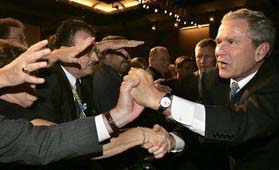
| |
Bush campaigns as if he were a populist, but his policies favor a razor-thin sliver of the nation
|
Not even Reagan was as ideological as Bush has been in his holding so unswervingly to the two dogmas in the face of strong contradictory evidence. In a direct comparison, no Reagan policy had a higher place on his agenda than deep reductions in the top tax brackets. He threw all his political power into pushing through by far the largest tax cut in history at that time, with the biggest gains going to the wealthiest citizens.
But the consequent reality of surging budget deficits then persuaded the administration to raise taxes three times, albeit, not enough to stop the flow of red ink.
Bush, like Reagan, forced through a huge first-year tax cut mainly benefiting those with high incomes. It too exploded into massive budget deficits. But unlike the Reagan administration, the response of Bush and his close advisers has been to cling to their ideological beliefs.
They had ignored the overwhelming evidence that the first tax cut was too deep and repeated the error with more tax cuts the next two years. Bush's tax policy turned a budget surplus in 2000 of $236 billion, or 2.4 percent of GDP, into a Congressional Budget Office-projected deficit of $477 billion, or 4.2 percent of GDP in 2004.
In their April 2004 report "Tax Returns," the Center on Budget and Policy Priorities found: "The swing of 6.6 percentage points of GDP is the sharpest deterioration in the nation's fiscal balance since World War II."
Together with an almost total lack of spending restraints, the tax cuts have created a gaping imbalance between federal revenues and expenditures, and thus massive budget deficits.
Even so, Bush chose not to follow his three predecessors -- Reagan, George H.W. Bush and Clinton -- in increasing income taxes, or the latter two in working with Congress to develop and maintain strong expenditure controls.
Turning to Iraq, two costly errors exemplify and summarize myriad other mistakes. First, Secretary of Defense Donald Rumsfeld decided to field a relatively small invading force in order to demonstrate the superiority of the more mobile army he saw as the wave of the future.
This decision ignored strong warnings from experts, such as the former head of the Joint Chiefs of Staff, Gen. Eric Shinseki, that far more troops would be needed in the occupation stage. Even when the problem of insufficient troops became clear, Rumsfeld refused to abandon his concept.
Second, Rumsfeld invaded Iraq without a strategy for stabilizing that nation, dismissing completely a well-thought-through State Department plan developed in the Future of Iraq project. The State Department effort spelled out many of the difficulties that would arise and that likely could have been avoided or mitigated had the administration followed it.
Rumsfeld's unwillingness to change direction proved to be particularly costly. The occupation continues to be plagued by a lack of troops and planning.
One deep institutional result of the stubbornness of Rumsfeld and the president is highlighted by Stanley Kutler's review of the Stephan Halper and Jonathan Clarke book, "America Alone:"
"Halper and Clarke denounce the Bush administration for effectively co-opting 'important allies and entire government agencies in a pattern of deceit.' The administration, they believe, created 'a synthetic neurosis,' which it buttressed by exploiting the Sept. 11 attack. The price was enormous, they say, with 'substantial damage' to both core American political institutions and to 'American legitimacy.' "
Among the nation's postwar foreign policies, Iraq is likely to rank with Lyndon Johnson's tragic course in Vietnam as the two efforts causing the most long-term damage to the United States' national security, internal political cohesiveness and international standing.
In both the tax-cut and Iraq cases, whatever the reasons -- stubbornness, arrogance or ideological rigidity -- the decisions reflected a common administration response in the face of sound contradictory evidence.
One aspect of administration policy has worked, however.
Amazingly and unfortunately, the dismal policy failures in pursuing the tax cuts and the invasion and occupation of Iraq are being sold as achievements during the presidential campaign and apparently being bought by large numbers of the public.
The Bush administration's strong suit has been its political propaganda machine. From the first tax cut introduced at the outset of the presidency, the administration has exploited every trick in the books to win the public to its side.This makes it imperative that the electorate has hard evidence readily available showing the dimensions of the failed presidency. What's needed is to provide a solid base for refuting the administration's deceptive presidential campaign, which has used alchemy to change the hard reality of its disastrous policy performance into untruths that proclaim a successful four years.
If not, the most polarizing and likely the most important election in the 60 years since WWII ended will be decided on misinformation and a distorted imagery that covers over a failed presidency.
The reasons to vote against Bush in the upcoming election go beyond partisanship. The nation has become an entrenched plutocracy ruled by immensely wealthy individuals and the leaders of corporate America. It closely resembles the Gilded Age of a hundred years earlier with its concentrated wealth and robber barons. We should truly fear for our country -- not because of the threat of terrorist attacks but because the nation's constitutional framework is being destroyed.
Is this destruction purposeful? Probably not. Nonetheless, that Bush sees himself as a patriot defending the nation does not refute the hard evidence that his misguided policies, based on now-disproved theories, are in fact destroying the American republic created by the Founders.
| |
Making excuses for economic failures
 |
|
 |
In
assessing President Bush's four-year economic performance, the standard measures show overwhelmingly that his record puts him at the bottom among the post-WWII presidents.
Also, the average family has lost ground during Bush's presidency. Since 2000, median family income (adjusted for inflation) has dropped by $1,535, or 3.4 percent, to $43,318.
When the eight previous postwar recoveries are measured two years out from their low points, the average annual real growth rate is 5.7 percent. Bush's economic growth rate is one-third lower at 3.6 percent, the lowest annual growth rate except for his father, George H.W. Bush.
George W. Bush has the worst performance on job creation of the postwar presidents with roughly a million net jobs lost since his inauguration. He will join Herbert Hoover as the only presidents to experience such a net decline of jobs.
In 2003, the number of people in poverty and those with no health insurance rose for the third straight year. Since 2000, the ranks of the poor had increased by 4.3 million persons. The number of individuals who were uninsured reached a record high of 45 million. Bush's 2003 budget deficit of $445 billion is the highest in history.
In the face of such results, Bush has sought to put the blame on extraordinary difficulties, such as the recession and the terrorist attacks, and claim that he has turned the economy around. His administration has ballyhooed 12 straight months of job gains that yielded 1.7 million new jobs -- an average of 140,000 new jobs a month -- as a signal achievement.
These gains, however, fall almost 40 percent below the average increase of 230,000 jobs a month at comparable points after the last two recessions in the early '80s and early '90s.
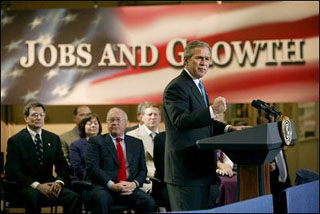
| |
Bush addressed employees of Timken Co, the largest employer in Canton, Ohio, on April 24, 2003. Just over a year later, the company announced it is laying off 1,300 employees, many from families who had worked there three or four generations
|
Thus, the Bush administration's one-year shortfall is over a million new jobs (12 months times 90,000 fewer jobs) less than the average performance by Presidents George H.W. Bush and Clinton.
The assertion that his performance has suffered because of more difficult problems is questionable. What Bush confronted, even the attacks, were not necessarily tougher economic challenges than those faced by past presidents. Rather Bush's dismal performance on almost every economic measure comes from his inefficient tax cuts totaling $1.7 trillion.
Such tax reductions stimulated economic activity but were far too costly and became the main cause of the massive deficits. Isaac Shapiro and Joel Friedman of the Center on Budget and Policy Priorities wrote that "the tax cuts are responsible for more than half of 2004 deficit."
An efficient stimulus package would have concentrated on putting funds in the hands of those who would spend it rapidly. Shapiro and Friedman have noted that Bush spurned the most efficient means, such as extending unemployment insurance benefits that generate 73 cents per dollar of lost revenue. Instead, he unwisely opted for dividend tax reductions that only generated 9 cents, and hence produced far greater budget deficits.
The most dangerous results from Bush's economic policies are those that have provided corporate America and the wealthy a disproportionately high share of the benefits and greater power at the expense of ordinary citizens.
Columbia University historian Alan Brinkley has written: "Since 1932, we have not had a president who has been more closely allied with business and more sympathetic to large and powerful corporations."
During the past three years, Bush's tax cuts have provided as much of his total reduction in income taxes to the top one percent of the population, whose average yearly earnings are $1.2 million, as to the bottom 80 percent. The middle class now has a larger share of the tax burden and faces a materially heightened threat to its long-term economic security.
The worsening income disparities between the rich and ordinary citizens -- the greatest since the 1920s -- have been a major factor pushing the nation into plutocratic governance. The tax reductions for the wealthy and major business firms provided money that helped fuel the campaigns of Washington politicians.
Under George W. Bush, the United States has become a government of the corporation, by the corporation and for the corporation, to paraphrase Abraham Lincoln's Gettysburg Address. Such an entrenched plutocracy is totally incompatible with the form of governance created by the Constitution to support representative democracy. This dimension of Bush's failed fiscal policies carries his performance into a different, frightening realm from his postwar predecessors.
| |
A failure of leadership: decisions defined by ideology
 |
|
 |
Sound
presidential decision-making structures do not guarantee a successful policy. But the worse the decision process, the greater the danger that the policy devised will fail and wreak havoc on the nation when it is a major initiative.
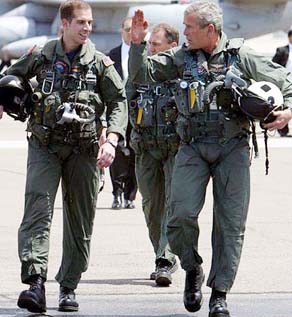
| |
After the Bush White House said it wasn't responsible for the dramatic "Mission Accomplished" banner behind the president on the U.S.S. Abraham Lincoln, former Gen. Wesley Clark quipped, "I guess that next thing we are going to hear is that the sailors told him to wear the flight suit and prance around on the aircraft carrier"
|
President Bush's decision to launch a pre-emptive invasion of Iraq is as good an example as I've seen of a severely flawed decision-making process producing an ill-thought-through decision that quickly became a nightmare as that misbegotten policy was put in place.
Anthony Cordesman of the Center for Strategic and International Studies called the National Security Council where the decision was made "the weakest and most ineffective National Security Council in post-war American history."
Ideologically driven incompetence as usual dominated. Vice President Dick Cheney, Secretary of Defense Donald Rumsfeld and other top Defense Department officials -- all civilians, not the generals and admirals they commanded -- pressed the neoconservative conviction that Iraq had become the center of worldwide terrorism.
David Kay, Bush's former weapons inspector in Iraq, told Congress in mid-August 2004 that National Security Adviser Condoleezza Rice had ill-served the president in terms of developing good intelligence on Iraq's weapons program. As Kay put it, Rice was "the dog that did not bark."
The problem, however, started with Bush's striking incompetence in directing his own policy-making structure. He did not understand how a well-functioning decision process worked or the importance of getting the facts. He knew little about Iraq and its complex history, seldom read any policy papers and had little curiosity.
Historically, the strongest institutional decision-making processes have had presidents with extensive policy knowledge who exerted intelligent guidance. Successful presidents demanded that their systems have the technical capacity to develop hard policy information and analyses to support reality testing.
Each president took the time to master policy papers and interacted with their top advisers as full participants in considering policy alternatives based on sound data and analyses.
Decision-making on Iraq featured two diametrically opposite mind-sets concerning the efficacy of valid numbers and informed analyses in the presidential decision process. The critical policy choice involved a lone truth teller against the neoconservative true believers.
How the two views played out in the decision-making process is shown best by two members of the National Security Council -- Cheney and Treasury Secretary Paul O'Neill -- who not only had similar characteristics but were best of friends.
Both were highly intelligent and deeply committed to the Republican cause. Each had experience with sound decision-making systems and had gained a reputation for being a prudent policy adviser.
By the start of the Bush administration, however, Cheney had morphed into a political ideologue rather than a policy analyst.
O'Neill had spent all his career in government at the Office of Management and Budget as the brightest career staff member of his time and then as a political appointee. He had inculcated the creed of information excellence and telling truth to power.
In 1988, O'Neill admonished young OMB staff members that their "guiding light of motivation" should be "the objective of living up to a standard which says in every decision the president has to make, he has from you the best and clearest exposition of the facts and arguments on every side of the issue that it is possible for a human mind to muster."
O'Neill kept telling the other decision makers they had no good evidence to justify a preemptive strike. This deep commitment to honest numbers made O'Neill the odd man out on the president's war council.
O'Neill, based on his direct participation in the process and his distinguished record as a public servant, is a most credible witness.
Pulitzer Prize-winning author Ron Suskind drew on him heavily in his book "The Price of Loyalty," which discussed the decision-making on Iraq in depth.
Suskind wrote that in Bush's decision-making process, "hard-eyed analysis would be painted as disloyalty." Instead, Cheney, the dominant behind-the-scenes manipulator, drove the decision-making process toward a choice consonant with the neoconservative dogma.
To do so, Cheney led what O'Neill labeled "a praetorian guard" that encircled Bush. Suskind underscored the fatal flaw in the Bush administration war council:
"The president was caught in an echo chamber of his own making, cut off from everyone other than (a small circle of advisers that) keeps him away from the one thing he needs most: honest, disinterested perspectives about what's real and what the hell he might do about it."
It was a horrendous decision that defied everything we know about good policy-making. Yet, the president and his top advisers brought the same mind-set to the implementation and management of the invasion and occupation of Iraq. They combined unswerving conviction and striking ignorance as ideologically driven incompetence was again the order of the day.
| |
A secretive, authoritarian White House
 |
|
 |
The
Founders of the American Republic in 1789 established three branches of government -- Congress, the presidency and the judiciary -- to uphold representative democracy in the new nation. After over more than 200 years, these great institutions of governance, housed in their magnificent buildings, bespeak permanence.
But deep within, these seemingly indestructible pillars of the Constitution are threatened by structural flaws. Nowhere is the threat greater than in the case of the system of checks and balances that are the key means the branches use to maintain institutional power.
Each branch must be able to check the others, including blocking them from usurping its own core functions.
Pulitzer-Prize-winning historian Garry Wills has indicated that the branches "have to fight off encroachment" so the executive can be stopped from legislating and Congress from seeking to execute.
These checks and balances that are at the heart of a viable American system of government must have a continuing balance of power among the branches in order to work. If not, a weaker branch will be unable to fight off encroachment.
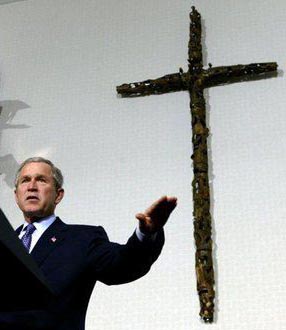
| |
After removing barriers that kept faith-based charities from receiving public money, the Bush/Cheney campaign asked churches to turn over membership directories and distribute literature
|
Today, however, there exists more imbalance than at any time in the post-WWII era. Greater power in the institutional relationship between Congress and the president has accrued to the Bush administration. Sen. Robert C. Byrd (D-W. Virginia) observed in the book, "Losing America," published this year: "The Bush team never tires in its drive to usurp congressional control of funding. (While Congress is) unwilling to assert its power, cowed, timid and deferential toward the Bush administration, a virtual paralytic."
A secretive, authoritarian White House runs the executive agencies with an iron hand, keeping them from communicating with Congress as much as possible.
In a particularly egregious case, political appointee Thomas Scully, then the head of the Medicare and Medicaid agency, threatened to fire Medicare's chief actuary, careerist Richard Foster, if he met Congress' request to provide his projected costs for Bush's proposed drug coverage legislation.
Such information was critical for sensible decision-making in that Foster's projections much exceeded the costs the administration set out in the proposed Medicare legislation. Lawmakers in both parties indicated they would not have voted for the bill if the higher cost projection had been known.
Robert Pear reported in the Sept. 8 New York Times that a legal ruling found that "Scully's threats to the actuary were 'a prime example of what Congress was attempting to prohibit' when it outlawed 'gag rules.'"
Keeping federal employees from communicating information requested by Congress that it must have to exercise informed policy choices undermines the checks and balances that are central to the constitutional process.
Congress is in intensive care, hurt by a power-hungry president, but suffering more from self-inflicted wounds. Its dysfunctional polarization has led members to focus on their own re-election and on being in the majority party. They flee the hard work of maintaining the institution's prestige and power.
The polarization has generally ruled any notions of bipartisanship or serious debate seeking compromise. In passing legislation including the Medicare bill, Republicans barred Democrats from the conference committees or let in a few who favored the legislation.
In conference committee sessions where usually only differences in bills are considered, Republicans have added new provisions that only their leadership has seen.
The most intense polarization between the political parties in the postwar years has played into President Bush's hands as the Republican congressional leadership has put winning above concern for the institution itself or the quality of the legislation.
Washington Post reporter Robert Kaiser wrote in a March 2004 article: "In fundamental ways that have gone largely unrecognized, Congress has become less vigilant, less proud and protective of its own prerogatives and less important to the conduct of the American government than at any time in decades."
Congress has been so battered from without and within that it has become a moribund institution. The last claim does not deny the obvious in that party leaders still exercise power over members, or that the latter still raise ridiculous sums of campaign funds and run for president.
Yet, they now go about their business in a burnt-out structure in institutional, not architectural terms. Byrd, who has served in Congress since 1952 and the Senate since 1958, wrote: "The Constitution's careful separation of powers has been breached, and its checks and balances circumvented."
Despite these system-threatening changes, the public has hardly noticed the deterioration and misshaping of the institutions of governance over the past quarter-century. Most people focus exclusively on the politicians and their policies, not their institutions.
This inattention has kept most Americans from recognizing the profound changes that have intensified under George W. Bush to a point where the checks and balances now work so poorly that democracy and liberty are threatened by the most undemocratic presidency since 1789.
| |
A reckless, extremist president in Reagan's shadow
 |
|
 |
George
W. Bush is unquestionably Ronald Reagan's political offspring with striking personal and ideological similarities; yet, the latter had a much more successful presidency than his heir.
Two factors stand out in distinguishing their performances: the skill of their top policy advisers and the differences in the political environments in which they operated. But first the almost eerie likeness needs setting out.
- Similarities: Both combined confidence, optimism and unshakable beliefs as history's two most ideological presidents. Although intelligent, the two had less curiosity than any other postwar president.
The two ignored or derided hard numbers or solid commentary that conflicted with their ideology.
Similar combinations of assets and liabilities meant both presidents became dependent on the organizational and policy skills, motives and judgment of advisers. Neither had sufficient understanding of the critical issues to differentiate good from bad advice.
-
Advisers: Reagan had two highly skilled pragmatists in his inner circle. James Baker, the president's chief of staff, in his first term worked tirelessly to keep the often too trusting president from supporting dangerous policies, such as those concocted by CIA Director William Casey.
Once Baker traded jobs with Treasury Secretary Donald Regan, the latter let the administration slide into the arms-for-hostages deal and the ensuing Iran-Contra scandal that blighted Reagan's second term.
One of the ablest Cabinet members of the postwar era, Secretary of State George Shultz, used his sound foreign policy knowledge and exceptional institutional skills to guide the president away from the bad ideas of other foreign policy advisers, craft a sturdy institutional framework and help Reagan work out a viable international strategy.
Bush's top foreign policy advisers were even more ideological than Bush and able to shape his policies -- particularly the pre-emptive invasion of Iraq -- in part by keeping the badly uninformed president from information that might challenge his beliefs.
- Different environments: If an awakening modern-day Rip Van Winkle had snoozed for 20 years between the Reagan and Bush inaugurations, he would be aghast at the changes brought by Reaganism.
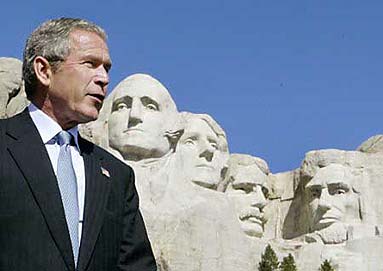
| |
While other presidents have used Mt. Rushmore as a backdrop, the Bush White House pushed TV crews far to one side to ensure that Bush's profile would be lined up with the heads carved on the mountain
|
Party polarization attained a level far beyond anything seen in the postwar era. Bipartisan compromise lay in intensive care. Representative democracy was on the endangered list as an early stage of plutocratic governance took hold.
Reagan's sunny style had dulled the harshness of his political philosophy. However, "Mean Reaganism" became the operating version of the doctrine in the Clinton administration as the 1994 midterm election brought 73 new Republicans to the U.S. House.
This core group -- dominated by angry true believers in Reaganism -- turned the House into a cauldron of vicious behavior, epitomized by the attempted impeachment of Bill Clinton.
By the end of Clinton's presidency, a polarized, rudderless Congress ceased to act as a deliberating body seeking compromises and often could barely function.
- A perplexing question: Where does this leave us? Likely the polarized 2001 environment and Bush's strong ideology made it highly unlikely that a competent pragmatist would be among the new president's most trusted policy advisers.
James Baker was picked as chief of staff over Edwin Meese even though he had supported Bush's father against Reagan and Meese had been Reagan's chief of staff in California. Baker was believed to be better equipped to do that job. It was that simple. When Bush chose his inner circle, loyalty to Bush dominated the selections.
The point needs underscoring that the inner circle of trusted advisers a president chooses can make or break his presidency. The choices become even more central when the president is woefully lacking in knowledge and analytic skills, as were Reagan and Bush.
That Reagan listened to Shultz, and Bush depended on Cheney and Rumsfeld, is critical for understanding the relative adroitness of Reagan's foreign policy compared with the string of disastrous choices by Bush.
A competent, pragmatic president using a sound decision-making process probably would have not made the ideologically driven mistakes that have afflicted the Bush administration.
It is also the case that such traits do not guarantee successful policies. Still, qualities such as organizational and policy knowledge and competence can be critically important.
The Bush administration has made painfully clear the danger of an anti-analytic, intellectually lazy president being advised by true believers who shun sound information and reasoned deliberations that could test their unshakable principles.
It is a formula for pushing an activist president into reckless decisions. When that president and his top advisers do not admit mistakes or accept hard facts, the subsequent misbegotten choices can produce a policy disaster of the order of Iraq.
| |
Bush's first term a failure of historic proportions
 |
|
 |
The
first term of George W. Bush's presidency should rate near the bottom among all the presidents since 1789:
- President Bush's economic record -- the worst in the postwar years -- has put the broad middle class in serious economic jeopardy.
- His administration's gross incompetence in Iraq has left the United States bogged down in a Vietnam-like quagmire while increasing world terrorism.
- By favoring big-money interests, Bush has entrenched plutocratic governance and diminished democracy.
Bush retains a far better image than his record warrants by repeatedly duping the public through the suppression of contradictory information and the employment of deceptive statements and lies. Douglas Jehl in the Sept. 16 New York Times wrote:
"A classified National Intelligence Estimate prepared for President Bush in late July spells out a dark assessment for Iraq, government officials said. The estimate outlines three possibilities for Iraq through 2005, with the worst case being developments that could lead to civil war, the officials said. The most favorable outcome described is an Iraq whose stability would remain tenuous in political, economic and security terms."
Once the government's own estimate was uncovered after being suppressed for nearly two months, Bush on the campaign trail ignored his own government's pessimistic evaluation of Iraq and said: "This country is headed toward democracy. Freedom is on the march."
The administration has not simply put a better spin on bad news; it has constructed a lie out of whole cloth. Bush and his minions hammered it into believability by repetition and a relentless defense of the claim.
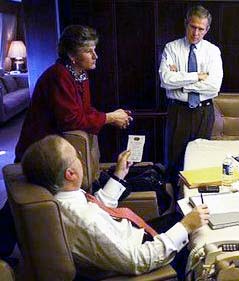
| |
Political advisors Karl Rove and Karen Hughes were instrumental in forging the White House politics of unreality
|
The propaganda works so well because it plays to the public's two big fears. First is the threat of a terrorist attack that the administration stokes with the horrible images of Sept. 11. Second is the danger of its comfortable myths being shattered. Just like Ronald Reagan, the Bush administration has employed the politics of unreality with great success.
The optimistic Reagan restored confidence during the 1981-82 recession by depicting an America he believed in wholeheartedly, but in fact no longer existed -- an America without limits.
Bush propagandists operated more cynically, based on their confidence that Americans will embrace an optimistic unreality rather than a myth-challenging truth, no matter how hard the evidence. When critics point to the actual reality, Bush spinners tarnish them with the sin of pessimism.
If the politics of unreality prevails and the American people cling to the administration's deception and lies, Bush will be re-elected. What can be expected in Bush's second term?
One part of the answer is more of the same because true believers are undeterred by reality. Worse, winning a second term can be read as a mandate to press on even more vigorously toward the Bush objectives.
The Bush propagandists will continue to paint Iraq as a success, as it moves toward a quagmire worse than Vietnam. While in the United States, plutocracy likely will become more entrenched and democracy becomes more myth than reality.
Bush's tax policies threaten the economic security of more and more of the broad middle class. A Sept.13 Center on Budget and Policy Priorities report indicates that the average tax reductions in 2004 from the earlier Bush tax legislation were $123,592 for millionaires; $34,992, for the top one percent of the population; and $647 for the middle 20 percent of the population.
It also pointed out that, measured as a share of the total economy, federal tax revenues this year drop to their 1959 level and individual income tax revenues, to their 1943 level. The CBPP report concluded that "we cannot run today's government on these revenue levels" because most of the current social and environment programs did not exist in 1959.
I confess to pessimism. Bush's tax policies have put ordinary citizens at great economic risk. I fear that the American government will not maintain democracy and will fail the great bulk of its citizens in their quest for a secure middle-class status at work and in retirement.
The overriding need is a full dose of hard facts about the real problems of a nation with severe limits now and in the future. Then, the electorate must accept this uncomfortable reality and the politicians act on it.
In this election, demand the facts and vote in your family's real interests. If you ignore the clear dangers by opting for a glowing unreality, welcome aboard for a calamitous second term.
Finally, remember that Cassandras are not always wrong -- and Bush's Trojan horse is at the gate.
Walter Williams is a professor emeritus at the University of Washington's Daniel J. Evans School of Public Affairs and is the author of "Reaganism and the Death of Representative Democracy"
This article first appeared as a series of commentaries in the Seattle Post-Intelligencer
Reprinted by permission
Photos courtesy the White House
Comments? Send a letter to the editor.Albion Monitor
October 9, 2004 (http://www.albionmonitor.com)All Rights Reserved. Contact rights@monitor.net for permission to use in any format. |
|


